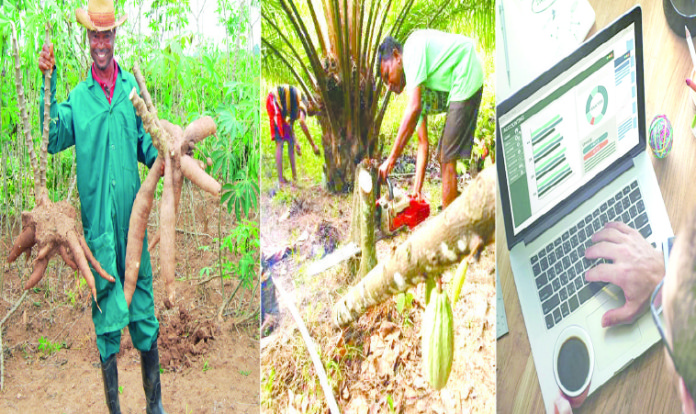Many families are going through harrowing times.
Banks have sacked over 10,000 workers in recent months. Media houses are reducing staff levels; The Guardian has fired hundreds of personnel in the first tranche, Vanguard has compiled a list, and other companies, from construction to food production, are toeing or plan to toe the same line as a consequence of the economic hardship.
As breadwinners return home with sack letters instead of loaves of bread, Reporter MMEDARAMFON UMOREN researches businesses they can fall back on.
The headlines: Fist Bank sacks 1,000 workers. Eco Bank 1,700. Access Bank 1,600. Diamond Bank 200. Employees in these and other banks are jittery.
Across economic sectors, even where there is job security for the time being, salary may not be regular.
The downsizing and rightsizing by companies is in a bid to stay afloat.
Managing Director/Chief Executive Officer (CEO) of Standard Chartered Nigeria, Bola Adesola, made the position of the Bankers’ Committee known in a press briefing at the end of their meeting on June 9.
She said: “Banks in the country are looking at ways to ensure that we minimise exits from our institutions. There will always be exits if there is fraud and so forth; people will exit institutions.
“Banks understand the implication of people not being in employment. So, we noted the market sentiments and going forward will be difficult but there will be reasons why people will exit not just in the banking industry but in telecoms and other industries.
“It is something that we will manage.”
Back in the labour market
A sack letter sends many back to the historical ranks of the unemployed, in search of a new job. Some who have the wherewithal travel out of the country for greener pastures.
However, there are many business opportunities one can venture into for a new start with benefits collected from the last employer. On can go solo in business or partner with someone trustworthy.
Agriculture
A source who pleaded anonymity said it has not been easy for him since he was sacked last year.
“I haven’t been able to secure another job, but I’ve decided to go into business rather than stay idle. My family needs to survive so I’m considering farming. I have a land already; all I need do is prepare for the next planting season and progress.
“I know it won’t yield immediately but when it does, it will be worth it,” he said.
Agriculture is a vast sector anyone may delve into. It includes:
Animal farming – poultry, fish, pig, cattle, snail, et cetera.
Crop farming – cassava, cocoa, cocoyam, yam, maize, cocoa, plantain, banana, apple, ugu leaf, water leaf, fluted pumpkin, tomatoes, pepper, rubber, et cetera.
Some of these crops can be exported to other countries to earn foreign exchange.
Lagos State Chairman of the Agriculture and Allied Employers Union of Nigeria (AAEUN), Lanre Oyenubi, insisted that “we have to go back to the basics – agriculture. It is agriculture that can give employment to 90 per cent of Nigerians.
“Even when you want every other industry or sector to grow, you need agriculture because agriculture is the link. There is a link between agriculture and every other industries.
“Take for instance, manufacturing. The raw materials required for the manufacturing sector depends on agriculture. And as such, without the agricultural sector, there is no way the manufacturing sector can develop or thrive.
“And if the manufacturing sector cannot develop, there is no way the economy can move forward.
“As a result of this, agriculture can gainfully employ 90 per cent of Nigerians if the right infrastructure is put in place.”
An unemployed young man, Hamid Momoh, also affirmed that agriculture should be the main focus in Nigeria and he has gone into cocoa business.
“The demand for agricultural produce is high, especially now that the economy is in a crisis. I have just begun transporting cocoa from Ondo to various parts of the country. It’s not so much, but with time, it will get better,” he enthused.
Rachael Kayode, a trader, has also decided to venture into agriculture.
“I consider agriculture as the backbone of the economic system of a given country. It provides job opportunities and is the key development agent of a nation. For me, ‘No Farmer No Nation’
“I served [in the National Youth Service Corps, NYSC] with the Federal College of Agriculture and my role was that of a farm supervisor. I’m interested in working as a farm manager so as to acquire capital to set up my own farm,” she disclosed.
Export prospects
There is a large number of Nigerians in countries such as the United Kingdom, United States, South Africa, Cameroun, Ghana, Gabon, Congo DR, and others who want Nigerian food items.
Nigerian Horticultural Research Institute (NIHORT) Executive Director, Adenike Olufolaji, in a paper presentation, listed export crops to the European Union (EU) to include okro, egg plant, pepper, ugu leaf, plantain, pawpaw, ogbono, banana, mango, ginger, garlic, nutmeg, scent leaf, and curry leaf.
Nigerian-American Chamber of Commerce (NACC) President, Sam Ohuabunwa, said Nigeria is yet to enjoy the benefits of the African Growth and Opportunity Act (AGOA).
He warned that the country risks not tapping the growth opportunities in the American legislation due to lack of effective support for export.
“There is a need for capacity building in customs regulations and operations and policy reforms that will develop the private sector to produce products that meet international trade and export standards,” Ohuabunwa counselled.
An industrialist, Gregory Egbe, argued that “AGOA was a good initiative. Nigeria failed to tap from it substantially as it ought because our productive base was nothing and our export commodity was mainly oil and gas.
“The oil madness and the easy money that was coming from it made us not to develop the industrial base, especially exportable commodities listed under AGOA in a competitive manner, despite a series of workshops and export tutorials for other non-oil commodity exporters who wanted to participate in the AGOA trade window.
“Some other African countries that did not have oil did well unlike Nigeria.”
Egbe stressed, however, that Nigeria still has another AGOA tenure to recover lost ground.
“AGOA has graciously been extended. That gives Nigeria another opportunity, especially now that the present government’s new agenda is to ginger productivity and re-create import substitution.
“What the government should do is to vigorously implement the Export Credit Guarantee Scheme (ECGS) which implementation has not efficiently helped product exporters, especially in the area of standard.
“Nigeria’s present quest to deepen commerce with China, which automatically results from the currency swap arrangement between the two countries, should not blind us to the opportunity that still exists in AGOA.”
Mike Nwaneri, former coordinating director of Nigeria Agricultural Quarantine Service, a department in the Federal Ministry of Agriculture and Rural Development (FMARD), confirmed that the e-platform for exporters complies with international requirements.
“Fruits and vegetables, including live cut flowers and plants, require specific conditioning/monitoring because consumers pay more attention to quality, safety, packaging.
“This is where Nigerian exporters are yet to utilise the opportunities and facilities available in cargo aviation at major airports,” he said.
At a seminar on Fresh Produce Export, a official of DHL said most times, international cargo carriers leave Nigeria virtually empty after coming in laden with goods.
Cargo planes, he noted, are well equipped to handle goods that require refrigeration and controlled atmospheric conditions to get them in good quality to consumers abroad.
Meeting standards
Primary commodities Nigerians export include garri, vegetables, rubber products, local fabrics, and packaged beef. Most do not meet international health and safety standards.
Acting Director General of Standards Organisation of Nigeria (SON), Paul Angya, said SON has started to encourage local production and introduced MANCAP certification.
MANCAP means Mandatory Conformity Assessment Programme.
Said he: “The certification is aimed at ensuring that all locally manufactured products conform to relevant Nigeria Industrial Standards (NIS), before they are presented to consumers.
“Every manufacturer in Nigeria is expected to get the certification before they push their products into the market and there are sanctions for defaulters.
“We insist that products manufactured in Nigeria must meet acceptable global standards. It is part of what we have been doing and we are still doing it – building the capacity of operators in our local industries.
“We have identified small and medium enterprises (SMEs) as the engine room of economic development. So, we have structured projects of offering technical assistance and certification to SMEs.”
Small scale enterprises
Other businesses the unemployed can go into include fashion designing, beading, wireworks, clothe accessories, cake baking, event planning, decoration, rental services, buying and selling goods, bag making, and shoe making.
Beauty Godwin, who learnt bead making during her NYSC service year, said she will open a shop to sell her works through physical purchase or by order.
“That way, I’d be able to take care of my basic needs and not keep waiting for a white collar job,” she enthused.
Dikans Udom, director of design at Obufaa Furniture Interior Design Decor, said it was not easy when he began, especially since it was a new venture in Uyo, but he continued because he had a vision which he needed to bring into reality and today, it is a success.
The federal government has created different opportunities for the unemployed to gain experience.
500,000 government teaching jobs
Through the N-Power Teacher Corps Programme, the federal government will engage and train 500,000 young unemployed graduates. It is a paid volunteering programme for two years.
The trainees will get computing devices that will contain information for their specific engagement as well as for continuous training and development.
Police to recruit 10,000
The police also plan to enlist 10,000 officers and men.
Police Service Commission (PSC) Head of Press and Public Relations, Ikechukwu Ani, said there would be no compromise as selection and collation would be done electronically.
Among the recruits would be cadet assistant superintendents of police (500), cadet inspectors (500), specialist officers (1,500), and constables (7,500).
Online services for a fee
There are various services one can render online for a fee. Dedicating time to satisfying an employer would attract a referral to others who need a reliable hand.
These services include
• Content writing
• Report writing
• Article writing
• Virtual assisting
• Editing
• Blogging
• Website design
“It was rough when I began and I was going through tough times. But one can’t succeed in anything without investing time.
“Patience also pays. Whatever an individual sets out to do should be worth it, so I continued, and now I have so much to do,” said Amaka Nduka, a freelance writer in Port Harcourt.











